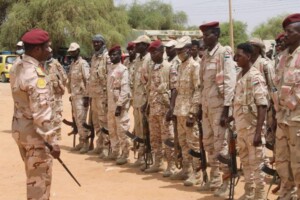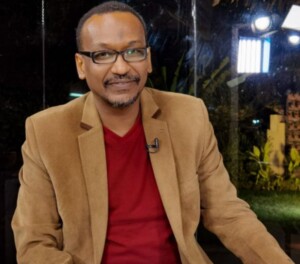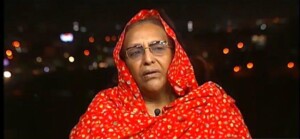Sudan revolutionaries demand reform of the armed forces
The statements of the president and deputy of the Sovereignty Council accusing political groups in the country of being more preoccupied with positions than politics, met with fierce criticism from various parties.
 Members of the Sudanese Journalist Network stage a protest (File photo)
Members of the Sudanese Journalist Network stage a protest (File photo)
The statements of the president and deputy of the Sovereignty Council accusing political groups in the country of being more preoccupied with positions than politics, met with fierce criticism from various parties. The Forces for Freedom and Change (FFC) urge the acceleration of the reform of the military and security service and the removal of remnants of the Al Bashir regime.
In response to a coup attempt that was thwarted on Tuesday, Lt Gen Abdelfattah El Burhan, Sovereignty Council President and Chief of the Sudan Armed Forces (SAF), and Lt Gen Mohamed Dagalo ‘Hemeti’ Sovereignty Council Deputy President and Chief of the Rapid Support Forces militia*, blamed Sudan’s political forces for the crisis in the country and condemned the lack of respect for the military.
They accused the politicians of squabbling and quarrelling over positions instead of working for the future of the country.
The FFC, the driving force behind the Sudanese revolution that led to the ousting of the regime of President Omar Al Bashir, considered the statements of the president and vice-president of the Sovereignty Council “a setback to the agenda of the revolution and the democratic transformation”.
The speeches of the military leaders contained “a load of fallacies and baseless accusations against the FFC,” the group said in a press statement yesterday. Their claims constitute “a direct threat to the democratic transition as they attempt to create a rift between the forces of the civil revolution and the armed forces of the people, and undermine the foundations on which the revolution was based”.
The FFC urged the acceleration of the reform of the military and security service, the removal of remnants [of the Al Bashir regime], and the implementation of the stipulations of the 2020 Juba Peace Agreement, in particular the implementation of the security arrangements protocol.
'Rehearsal'
According to the Sudanese Congress Party (SCP), “the statements of the chairman of the Sovereignty Council and his deputy included dangerous indicators and unacceptable contradictions”.
'The military are responsible for the failure to handle the growing insecurity in the country and prevent repeated coup attempts' – Sudanese Congress Party
The SCP holds the military responsible for the crises the country is going through, “by claiming a monopoly of guardianship over the country and the sole right to lead it through the transitional period”.
In a press statement yesterday, the party holds the military responsible for “the failure to handle the growing insecurity in large parts of the country in a systematic manner and prevent repeated coup attempts,” and called for “the unification of the armed forces under auspices of a professional military institution”. The party further demands the Ministry of Finance to be solely responsible for all public resources, including investment companies affiliated with the military forces.
The Sudanese Journalists Network also considers the statements of the military leaders of the country on Wednesday “an advanced step towards the seizure of power”. The network will work with other forces “to urgently mobilise the people and develop a professional plan of action to confront such attempts”.
The Democratic Lawyers Alliance described the aborted coup attempt on Tuesday as a “rehearsal and a measuring device to show the extent of the street's reaction to military change”. The lawyers wondered why information about the coup attempt only came from the military themselves and why the names of the people behind the coup have not been made known yet. They called for regular updates about the investigations.
Civilian rule
The alliance, together with the Sudan Doctors Central Committee, the Preparatory Committee for the Restoration of the Journalists Syndicate, the Pharmacists Committee, the Laboratory Technicians Committee, Resistance Committees in Khartoum, and 17 other professional and revolutionary associations signed a joint statement in which they strongly rejected the statements of El Burhan and Hemeti.
Activists in El Obeid in North Kordofan, Nyala in South Darfur, Delling in South Kordofan, and El Gedaref, on Thursday, staged protests vigils condemning the failed coup attempt and the statements of the military leaders. The demonstrators all called for civilian rule.
* The paramilitary Rapid Support Forces (RSF) was set up by the ousted Al Bashir regime in 2013. The militia which grew out of the Janjaweed groups which fought for the Sudanese government in Darfur since the war broke out 2003, is widely believed to be responsible for atrocities in the region in the past six-seven years. The RSF are also held responsible for the violent break-up of the Khartoum sit-in in June 3 last year. Tens of thousands of RSF troops have joined the Saudi-led campaign against the Houthi rebels in Yemen since 2015.
The RSF has reportedly built up a vast business empire that captures not only a large part of the country’s gold industry, but has huge interests in many sectors of the Sudanese economy as well.
Officially, the RSF was integrated into the Sudan Armed Forces (SAF) two years ago. In the August 2019 Constitutional Charter it was agreed that both the army and the RSF will fall under the command of the “Supreme Commander of the Sudan Armed Forces”. At the same time however, the militia stayed a force unto intself, commanded by Mohamed Dagalo ‘Hemeti’, Vice-President of Sudan’s Sovereignty Council.
In the Juba Peace Agreement of October 2020, the Sudanese government and a number of rebel movements agreed to form a single national professional army with a new unified military doctrine making the SAF, RSF, other security forces, and combatants of former rebel movements “a single unified regular force that serves the supreme interests of State of Sudan”. In June this year, Hemeti publicly refused the integration of his forces into the Sudanese army. Later that month, Prime Minister Abdallah Hamdok spoke about the need to reform Sudan’s military institutions, including the integration of the RSF militia into “a unified national army”.











 and then
and then